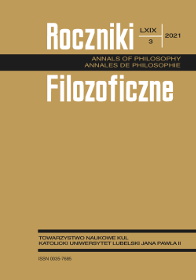Experiential Dissonance and Divine Hiddenness
Abstract
Our expectations for human experience of God can obscure the reality and the presence of such experience for us. They can lead us to look in the wrong places for God’s presence, and they can lead us not to look at all. This article counters the threat of misleading expectations regarding God, while acknowledging a role for diving hiding from humans on occasion. It contends that, given God’s perfect moral character, we should expect typical human experience of God to have moral dissonance, that is, experiential conflict in morally relevant ways. We shall see the evidential or cognitive importance of how humans respond to such dissonance. Our failing to respond cooperatively with God can result either in our obscuring evidence of divine reality or in God’s hiding divine self-manifestation for redemptive purposes aimed at our benefit.
References
Davies, W. D., and Dale C. Allison, Jr. A Critical and Exegetical Commentary on the Gospel According to Saint Matthew. Vol. 2. Edinburgh: T&T Clark, 1991.
Fitzmyer, Joseph A. The Gospel According to Luke. New York: Doubleday, 1985.
Hunter, A. M. “Crux Criticorum—Matt. 11:25–30—A Re-Appraisal.” New Testament Studies 8 (1962): 241–49.
Jones, Rufus. Pathways to the Reality of God. New York: Macmillan, 1931.
Meier, John. A Marginal Jew. Vol. 4, Law and Love. New Haven, CT: Yale University Press, 2009.
Moser, Paul K. The Divine Goodness of Jesus. Cambridge: Cambridge University Press, 2021.
Moser, Paul K. The God Relationship. Cambridge: Cambridge University Press, 2017.
Moser, Paul K. Understanding Religious Experience. Cambridge: Cambridge University Press, 2020.
Copyright (c) 2021 Roczniki Filozoficzne

This work is licensed under a Creative Commons Attribution-NonCommercial-NoDerivatives 4.0 International License.





